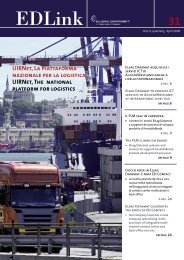Scarica numero di ED Link - Elsag Datamat
Scarica numero di ED Link - Elsag Datamat
Scarica numero di ED Link - Elsag Datamat
You also want an ePaper? Increase the reach of your titles
YUMPU automatically turns print PDFs into web optimized ePapers that Google loves.
DID YOU KNOW...<br />
Palazzo Reale a Genova<br />
Palazzo Reale in Genoa<br />
slaves in Messina and transferred them<br />
to his home city. But Giorgio wasn’t<br />
one to give up and he decided to apply<br />
to the government of the “Superba”<br />
for his freedom because he had been<br />
betrayed into slavery. In an example of<br />
true democracy at work, the authorities<br />
agreed with him. The doge, Antoniotto<br />
Adorno, freed Durazzo, who<br />
adopted the name of his home town as<br />
the family surname, and granted him<br />
citizenship of Genoa. For the Durazzo<br />
family it was the start of a new life.<br />
With commitment and tenacity, the<br />
family successfully amassed a remarkable<br />
fortune in the space of just a few<br />
generations. Their skill at exploiting<br />
the power of finance and its management<br />
(a Genoese <strong>di</strong>scovery) enabled<br />
them to enter the elite group of financiers<br />
from Genoa who dominated the<br />
world for several centuries.<br />
In 1528 the new reform introduced by<br />
Andrea Doria came into effect: Genoa<br />
became an oligarchic republic in which<br />
only the members of aristocratic families<br />
entered in a special register could<br />
hold government posts. “Enlightened”<br />
Andrea Doria<br />
or successful members of the bourgeoisie<br />
were able, however, to become<br />
members of the nobility by “registering”<br />
with one of the recognised families.<br />
During this period other Albanian<br />
families were integrated into the life of<br />
the city, but none with the success of<br />
the Durazzos, who were by then fifth<br />
generation patricians, and whose sixth<br />
generation produced the family’s first<br />
doge (Giacomo). The wealth and influence<br />
of the family were such that in the<br />
eighteenth century Genoa was dubbed<br />
the “Durazzian Republic”. Financial acumen,<br />
carefully arranged marriages, and<br />
investments in land across Liguria fed<br />
the family myth for many years, giving<br />
it a virtual monopoly on the appointment<br />
of doges.<br />
The fortune amassed by the family was<br />
used both for major charitable works<br />
and to provide support for the poor (as<br />
was customary and useful in the Republic<br />
in order to maintain social control),<br />
as well as for patronage of the arts (the<br />
Falcone Theatre, the first public theatre<br />
in Genoa and one of the first in Italy,<br />
was financed by the Durazzo family).<br />
46



